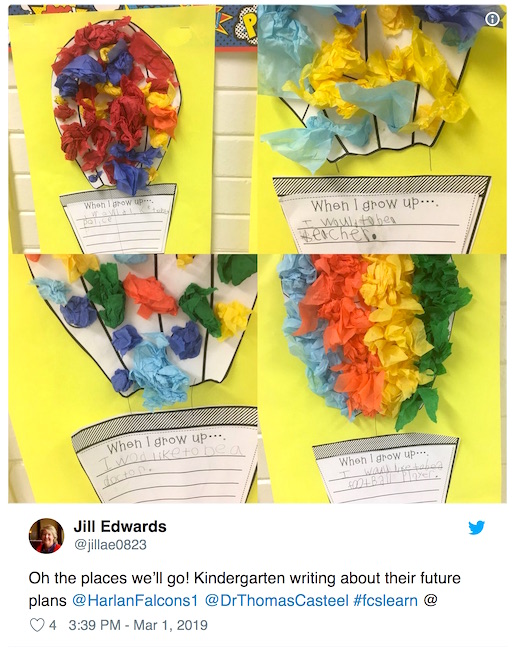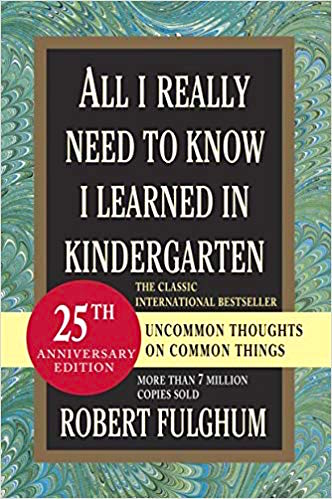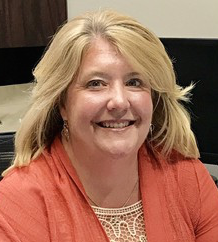As February storms into March, educators far and wide all know we have hit some of the most challenging months of our school year. Why? Because “we” the grownups are tired – and when that happens, we relax on the very routines and procedures that are the glue that have kept us together all year.
These daily structures are more important than some may realize. Not long ago, the second grade teachers at our school went on a walk-through to visit our kindergarten classrooms during their Reading Horizons lessons. When we debriefed their visits, the 2nd grade teachers were all amazed about how well the students listened, followed directions, and the way the kindergarten teachers had “seen” what was best to do regarding seating, organization, and routine in ways that naturally improved the lesson.
As our second grade teachers reveled in the masterful way our kindergarten teachers managed some of our smallest learners, I remembered a book I had read long ago – and its title – “All I Really Need to Know I Learned in Kindergarten.” At the bottom of this blog is an excerpt from that book by Robert Fulghum. His simple message is one that we should all live by every day.
 Many times in schools and classrooms we get in a rut and say things about our students such as, “THEY just don’t know how to act” or “THEY just don’t care.” But honestly, if you go back to kindergarten and really study those teachers, you know we are wrong to make such statements about our kids.
Many times in schools and classrooms we get in a rut and say things about our students such as, “THEY just don’t know how to act” or “THEY just don’t care.” But honestly, if you go back to kindergarten and really study those teachers, you know we are wrong to make such statements about our kids.
When you take a close look at really adept kindergarten teachers you see that they are masterful at predicting the organization and structure our classrooms desperately need. Savvy kindergarten teachers naturally know about formative assessment and can actually tell you without any form of documentation in front of them which kids know their letters, their sounds, and even who is afraid of the dark. They really know their students. They know who can sit where, which kids need a partner, and who can work alone.
As we move into spring, we all need to remember what our kindergarten teachers know all too well – that every day we must remind, reinforce and recognize that students thrive under routine, procedure, and positive reinforcement of what is expected. When we not only remember this but adhere to this for all of our students, there is an energy that just can’t be stopped.
And as Robert Fulghum so adeptly says at the end of this message from his memorable essay collection: “And it is still true, no matter how old you are — when you go out into the world, it is best to hold hands and stick together.”
As we work these last few months, we must remember those simple messages: Stay on target. Stick to our structures and routines. And by all means – collaborate.
 All I Really Need To Know
All I Really Need To Know
I Learned In Kindergarten
by Robert Fulghum
ALL I REALLY NEED TO KNOW about how to live and what to do
and how to be I learned in kindergarten. Wisdom was not
at the top of the graduate-school mountain, but there in the
sandpile at Sunday School. These are the things I learned:
Share everything.
Play fair.
Don’t hit people.
Put things back where you found them.
Clean up your own mess.
Don’t take things that aren’t yours.
Say you’re sorry when you hurt somebody.
Wash your hands before you eat.
Flush.
Warm cookies and cold milk are good for you.
Live a balanced life – learn some and think some
and draw and paint and sing and dance and play
and work every day some.
Take a nap every afternoon.
When you go out into the world, watch out for traffic,
hold hands, and stick together.
Be aware of wonder.
Remember the little seed in the styrofoam cup:
The roots go down and the plant goes up and nobody
really knows how or why, but we are all like that.
Goldfish and hamsters and white mice and even
the little seed in the Styrofoam cup – they all die.
So do we.
And then remember the Dick-and-Jane books
and the first word you learned – the biggest
word of all – LOOK.
Everything you need to know is in there somewhere.
The Golden Rule and love and basic sanitation.
Ecology and politics and equality and sane living.
Take any of those items and extrapolate it into
sophisticated adult terms and apply it to your
family life or your work or your government or
your world and it holds true and clear and firm.
Think what a better world it would be if
all – the whole world – had cookies and milk about
three o’clock every afternoon and then lay down with
our blankies for a nap. Or if all governments
had a basic policy to always put things back where
they found them and to clean up their own mess.
And it is still true, no matter how old you
are – when you go out into the world, it is best
to hold hands and stick together.
(Excerpted from All I Really Need to Know I Learned in Kindergarten, Ivy Books, 1989; Ballentine, 2004.)
Jill Edwards is assistant principal at Harlan Elementary in the Florence City (AL) Schools. Her 15-year education career is highlighted in this earlier ABPC blog post. To learn more about the work at Harlan, see this post, “September Strong.” Follow Jill on Twitter @jillae0823.


0 Comments on "During the Most Challenging Months of the School Year, Kindergarten Says It Best"